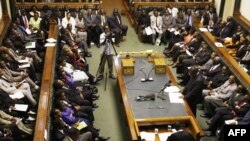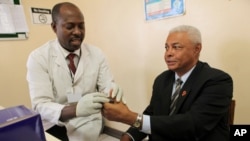HARARE - An informal group known as Zimbabwe Parliamentarians Against HIV and AIDS is taking steps to break down the stigma about the disease. More than 60 lawmakers went for a voluntary HIV test Thursday. On Friday, some male members of parliament are expected to be circumcised as the country intensifies efforts to combat HIV and AIDS.
In what might be a response to a call by President Robert Mugabe for politicians to reveal their HIV status, some MPs submitted to the voluntary HIV tests.
Mugabe recently said that revealing HIV status will help stop the spread of the pandemic and fight the stigma associated with the virus that causes AIDS.
Zimbabwe’s parliament was turned into an HIV testing center. Parliament Member Sarah Mahoka tested negative and did not mind revealing her status to the media.
“I went for testing because I want people in my constituency to follow suit and know their status and get treatment [if they are HIV-positive so they do not die or spread the virus," said Mahoka. "Men, especially in high offices, need education. They spread HIV to our young girls knowing their status.”
Mahoka, a member of Mugabe’s ZANU-PF party, did not specify which men in high offices she was referring to. In March of this year, Mugabe said he was worried his colleagues in ZANU-PF and the cabinet were dying of HIV-related illnesses.
Speaker of Parliament Lovemore Moyo was among MPs who were tested for HIV. He said parliament took Mugabe’s calls seriously, but expects other branches of the government to do the same.
“What we are doing here were not dramatizing anything," said Moyo. "It is a clear demonstration that this institution is walking the talk. All what is left is to see our counterparts in the executive, judiciary also taking a leaf from what this institution [has done]. It is our desire that Zimbabweans will learn from this exercise.”
Some male parliament members will be circumcised Friday. Researchers say male circumcision reduces the chance of spreading HIV by about 60 percent.
United Nations figures say HIV prevalence in Zimbabwe declined sharply in the past decade, from about 29 percent to just about 13 percent in 2009. But the United Nations says about 1.2 million Zimbabweans were living with HIV as of 2009.
In what might be a response to a call by President Robert Mugabe for politicians to reveal their HIV status, some MPs submitted to the voluntary HIV tests.
Mugabe recently said that revealing HIV status will help stop the spread of the pandemic and fight the stigma associated with the virus that causes AIDS.
Zimbabwe’s parliament was turned into an HIV testing center. Parliament Member Sarah Mahoka tested negative and did not mind revealing her status to the media.
“I went for testing because I want people in my constituency to follow suit and know their status and get treatment [if they are HIV-positive so they do not die or spread the virus," said Mahoka. "Men, especially in high offices, need education. They spread HIV to our young girls knowing their status.”
Mahoka, a member of Mugabe’s ZANU-PF party, did not specify which men in high offices she was referring to. In March of this year, Mugabe said he was worried his colleagues in ZANU-PF and the cabinet were dying of HIV-related illnesses.
Speaker of Parliament Lovemore Moyo was among MPs who were tested for HIV. He said parliament took Mugabe’s calls seriously, but expects other branches of the government to do the same.
“What we are doing here were not dramatizing anything," said Moyo. "It is a clear demonstration that this institution is walking the talk. All what is left is to see our counterparts in the executive, judiciary also taking a leaf from what this institution [has done]. It is our desire that Zimbabweans will learn from this exercise.”
Some male parliament members will be circumcised Friday. Researchers say male circumcision reduces the chance of spreading HIV by about 60 percent.
United Nations figures say HIV prevalence in Zimbabwe declined sharply in the past decade, from about 29 percent to just about 13 percent in 2009. But the United Nations says about 1.2 million Zimbabweans were living with HIV as of 2009.





